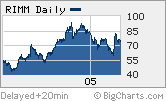 |
| Motion sickness: It's been a bumpy ride for investors in Research in Motion during the past year. |
|
|
|
|
|
NEW YORK (CNN/Money) -
Tech investors like the taste of fruit this year.
Shares of Apple (Research) have been a big hit. And Research in Motion (Research), maker of the BlackBerry e-mail device, has been a tasty treat as well lately. The stock has surged nearly 25 percent in the past three weeks.
Wall Street is betting on good news from RIM when it reports its fiscal fourth quarter results on Tuesday. Analysts expect sales of $410 million, up 95 percent from a year ago and earnings of 65 cents, up 132 percent from last year.
But optimism about the company's fundamentals isn't the only reason the stock has taken off.
Prior to this recent move, shares had been extremely volatile due to worries about a lingering patent infringement lawsuit filed against the company by NTP, a privately held firm that claimed to own the patents to various wireless technologies used by RIM.
There were some fears that NTP could force RIM to stop selling the BlackBerry since a U.S. judge ruled in favor of NTP in 2003 and an appeals court upheld the ruling late last year.
This legal overhang is no longer an issue. The two companies agreed to a settlement last month in which RIM will pay NTP $450 million. Analysts said that's a small price to pay for RIM, considering that even after the settlement, the company would still have about $1.2 billion in cash and investments.
Competition could leave a sour taste...
With the NTP case out of the way though, Wall Street's attention will turn to the subject of competition. Here, analysts are more divided about what lies ahead for the company.
The Waterloo, Ontario-based firm has benefited from having a strong position in the corporate market, particularly in the financial community. RIM has more than 2 million subscribers to its BlackBerry service and many Wall Street traders seem to have BlackBerries surgically attached to their hands.
But some analysts are worried that RIM could soon see its lead erode in this market. Companies like PalmOne (Research), which makes the Treo smartphone, as well as cell phone manufacturers like Nokia (Research) and Motorola (Research), which are expected to roll out devices similar to the BlackBerry later this year that will run on software from Microsoft (Research), could get more aggressive in courting the corporate customer.
"The fact that competition is coming has been talked about for some time but I believe the threat is more real now since handset companies are partnering with Microsoft," said T. Michael Walkley, an analyst with Piper Jaffray.
Walkley said that the biggest concern about increased competition is that RIM could eventually find itself facing a price war, similar to what is going on in the PC market. And since RIM generates about 70 percent of its revenues from BlackBerry devices, he said that could cripple profit margins.
But other analysts don't think RIM has much to worry about since it has done a good job of partnering with wireless carriers like Verizon Wireless and T-Mobile, which both sell phones using BlackBerry's e-mail software, in order to increase their customer base.
To that end, Research in Motion generates about a quarter of its sales from subscriber fees and software licensing. These businesses tend to be more profitable than selling hardware.
"Over the next few years, the service side should pick up and contribute more significantly to earnings," said Barry Richards, an analyst with Paradigm Capital, an investment bank based in Toronto.
...but growth and valuation are still sweet
There's also the fact that even though the BlackBerry is a well-known brand name in corporate circles, the company still has a relatively small percentage of the overall wireless device market. As such, RIM doesn't need to make significant gains among retail consumers in order to boost its market share.
"People are underestimating their ability to gain respectable market share in the handset business," said Gus Papageorgiou, an analyst with Scotia Capital, an investment bank based in Toronto. "This is a niche player that could be a bigger niche player."
Along those lines, Richards adds that the company still has ample opportunities to expand internationally. In fiscal 2004, sales outside of North America accounted for just 16 percent of revenues.
So what's next for RIM's stock? Despite some worries about increased competition, RIM is still expected to do extremely well in this fiscal year, which ends in February 2006. Analysts expect revenues to increase 54 percent and that profits will jump 38 percent.
And considering these fundamentals, the stock does not look all that expensive. Shares trade at about 26 times estimates for this fiscal year.
"It's not a cheap stock, but given the growth, I don't think the valuation is crazy," said Papageorgiou.
The one risk that investors need to pay attention to though is that the stock often heads higher on takeover speculation. During the past few years, companies ranging from Hewlett-Packard to Nokia have been rumored to be interested in the company.
But given RIM's market value of about $14 billion and its premium multiple, Richard Williams, an analyst with Garban Institutional Equities, says an acquisition of the company is unlikely since a buyer would take a huge hit to earnings in the near-term by purchasing RIM.
For more about personal technology, click here.
For more about Apple's hot start to 2005, click here.
Paradigm Capital's Richards owns shares of Research in Motion but his firm has no investment banking relationships with the company. None of the other analysts quoted in this story own shares of RIM and their firms have not done investment banking business with the company.

|